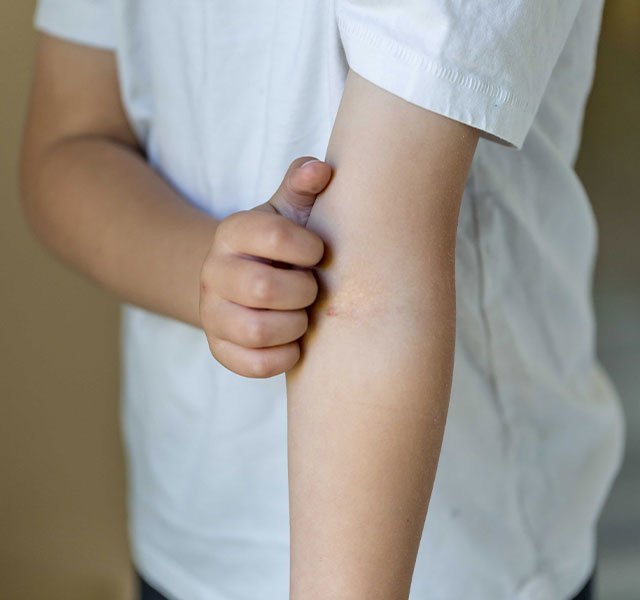When the temps start to drop and the furnaces kick on and start to heat our homes and schools, you may see your child scratching, then notice a rash or dry, scaly patches on his or her skin. If that’s the case, it might be time to ask your child’s doctor about eczema.
Eczema is a group of skin conditions that affects people of all ages, but is primarily seen in children – with varying symptoms.
“Eczema is a defect in the skin barrier,” says Marisa Elias, M.D., a pediatrician with Henry Ford Health. “Healthy skin keeps moisture in and infection out.”
Keeping skin hydrated is especially important during the winter, when the weather tends to make skin drier. Children with eczema have very sensitive skin, which is easily irritated. Their skin is often itchy, and eczema’s rash results from scratching or rubbing the skin.
“One of my professors called eczema, ‘the itch that rashes,’” Dr. Elias says. “The child scratches, then the rash appears.”
According to the National Eczema Association (NEA), there are several types of eczema. Atopic dermatitis is the most common type of eczema, affecting 9.6 million of all children under age 18 in the United States. Approximately one-third of those cases, or 3.2 million children, have moderate to severe eczema.
In mild cases, the skin is dry, scaly, red and itchy. More severe eczema may have oozing, crusting and bleeding. While eczema can be itchy and annoying, it is not usually dangerous.
“It is not contagious,” Dr. Elias says. “However, repeated scratching of the skin can increase the risk of infections.”
How to Treat or Prevent Eczema
To help lessen symptoms during flare-ups, Dr. Elias recommends a 10-minute daily bath followed by moisturizing the skin with thick over-the-counter products like Vaseline, Aquaphor or Eucerin.“Any preparation that comes in a tub will be thicker than those that have a pump and retain the moisture better,” she says.
Dr. Elias recommends applying these products at least three times daily — before school, after school and before bedtime. More serious cases may require prescription creams, some of which contain steroids.
“If you have a prescription from your doctor, apply that first on the skin,” Dr. Elias says. “Then, cover it and the entire body with the over-the-counter product to seal it in.”
Some children can grow out of eczema. However, Dr. Elias notes that children who also have asthma and allergies are less likely to outgrow this skin condition.
To find a pediatrician at Henry Ford, visit henryford.com or call 1-800-HENRYFORD (436-7936).
Need care today? Check out the many options offered to help you and your child get the care you need, from the MyCare advice line to same-day appointments, walk-in clinics and more.
Dr. Marisa Elias is a pediatrician seeing patients at Henry Ford Medical Center – Royal Oak.



